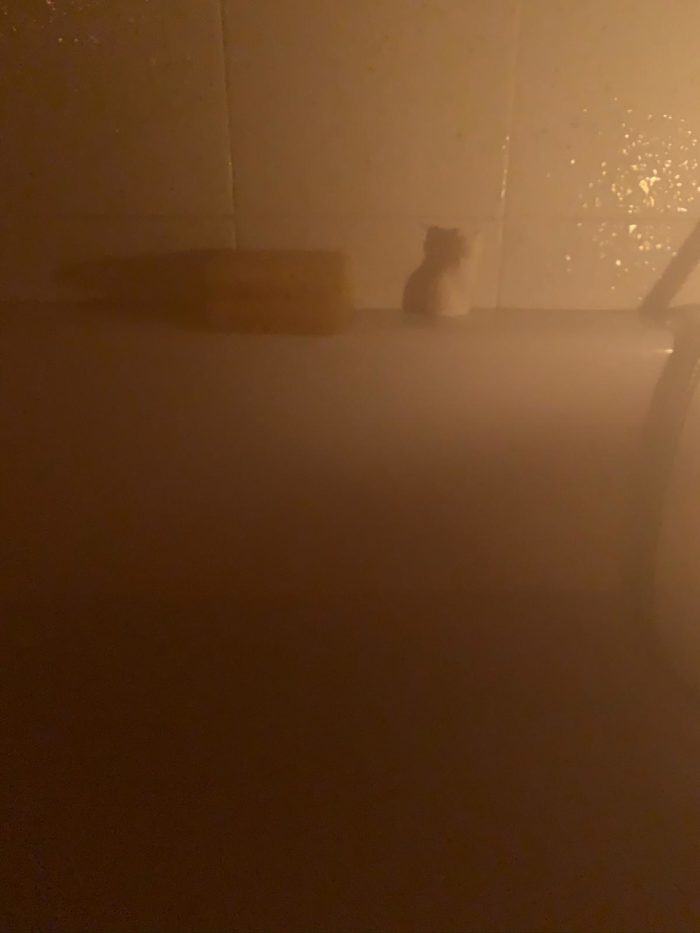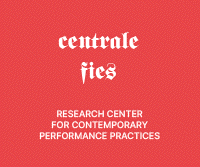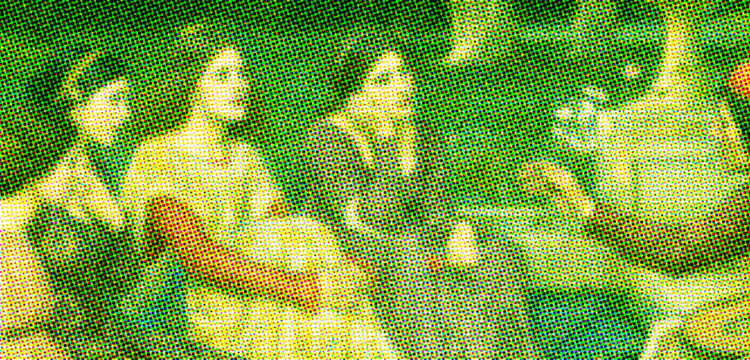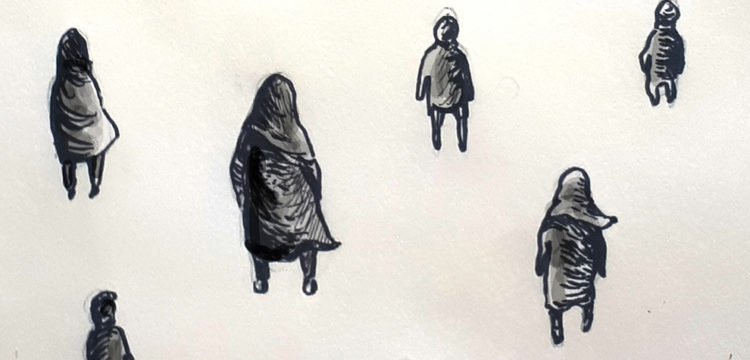A Quarantine in My Bathtub
What is reading for pleasure?
the different smells out of the different kitchens
they come through the cool air of the cracked window
the effects of a home spa, hot feet on cool tiles
the steam covering the mirror, a sea breeze scented candle
a sea I cannot visit
a fresh towel on the rack
softens someone else’s clutter
fingers and toes turn to speckled sponges
my bluetooth speaker and books for listening, waterproof, ready for
my lazy learning.
The only thing I can manage these days is to take a bath. With regularity and drive, I take comfort in the ritual, I set myself into the water and belong for a while. I belong with my body. In a condition in which I cannot go out, I cannot stretch my legs, I cannot direct my face towards the sun—water seems like the Earthliest option. I sit there with my soggy thoughts.
A quarantine in my bathtub. What a lucky bitch. The woman and the realm of the home. Antigone takes a bath and maybe her rage dissipates (they hope so), the heat, the steam, the eucalyptus aroma fills the small room, coats viscous the white tiles. I sit here with my sweaty brain and wonder if it is possible to acquire new goals. I wonder if my rage will shift into a new sense of life and living as all the predictions claim. I wonder, doubtfully, if the virus will change us for the better.
The first book was an accident. When this all began, I was in Ireland on a long-planned family reunion with my father and aunt who are both in their seventies. Italy went into lockdown midweek and on my flight home I had to wear a bulky mask and latex gloves. I was terrified. And yet, I didn’t want to be bored. With my mask on it was difficult to wear glasses without having them fog up and so I downloaded an audio book and listened for the entire flight. I listened all the way home to Bologna and into the bathtub once I got there. I needed to sanitize myself post-travel anyhow. I kept listening. The lesson was already beginning.
The first text I listen to is Carmen Maria Machado’s In the Dreamhouse: A Memoir and it is all too fitting. A woman in an abusive relationship finds that she cannot leave the house she and her partner have come to inhabit together. Machado describes a cage created through psychological abuse within a lesbian relationship. I didn’t know how much the book would resonate with me. I chose it on a whim. Machado is a writer I’d heard about for a long time and never gotten around to reading. Now, as we are all in confined spaces, often with the ones we love, the wisdom and clarity to set boundaries, to be honest, to be kind, and to know when we hurt one another seems all the more important. The strains of daily life when you can’t leave the house can bring out the worst in us. Machado writes, “I speak into the silence. I toss the stone of my story into a vast crevice; measure the emptiness by its small sound.” Closed off in our houses the emptiness grows. Even our best efforts at communication tossed into the abyss of the Internet.
It was with this first book that I found myself enraptured by the rhythms and sways of the author reading to me. The reassurance of being told something. I found a new passivity in this form of “reading.” My effort was barely discernable from my gazing off into space and yet my entire body was participating in the absorption of the text. Except, that is, when I dunked my head beneath the water.
Then comes Rebecca Solnit’s Recollections of My Nonexistence. Solnit is a writer I have known and read and loved for a while now. She says many intelligent things in this book about women making their way as writers in the world, but she also talks about, how for women, doing anything is always tied up with the body. Solnit recalls coming of age in San Francisco in the 1980s and the state of constant fear women face on a daily basis doing things male-bodied folks tend to take for granted. She writes, “We die all the time to avoid being killed.” Are we all dying a little at this very moment in our real and necessary fear for survival? Some of us are certainly dying more than others. If I am honest, I don’t remember much of what happens in the book, I do remember wanting to remember things she says, but my prune fingers couldn’t be bothered to write them down. At one point she quotes the Book of Isaiah: “all flesh is grass.” Does it mean something will grow forth from me? Because I am alive? It brightens me to think of verdant life outside these walls and my belonging to it all.
The effort and the resilience demanded of us seems to compound each day. For mothers this is even more so. I talk to colleagues who are single mothers, in their houses with their children and working remotely and also helping those children with online learning. I could include many single fathers in here, too. But most domestic labor in Italy still falls to the woman and during this time of crisis and quarantine the unpaid labor has increased while the paid labor has vanished. There is no way to escape, not each other and not ourselves. In the world of the audio book I don’t have to look here or there, I can busy my body or let it rest. My mind weaves connections based on the last sounds of the last words of a chapter and between the running tap.

Could it be that this is a feminist time, a time to be with the body and with the world in a different way? In listening to Sara Ahmed’s Living a Feminist Life. I find the world of the domestic, of being in my house, brings out my more “feminine characteristics.” About this I am not essentialist, but I was raised by a mother who was home most of the time. She cooked and cleaned and baked. And she was also often depressed and prone to debilitating migraines. And so, I tend to associate all of these things with her. Ahmed claims sadness as feminist practice, “we are not quite in the lives we are supposed to be in.” Therefore, we are sad. Now, it seems none of us are in the lives we are supposed to be in. I bake when I am sad, and I am sad right now. I have extreme highs and extreme lows. Sadness, we are told by institutions, is not the state we are meant to inhabit during this trying time. I am repeatedly implored to keep a positive image and to be strong for others. Instead I gaze out the window and watch reruns of Law & Order; instead, I search for waterproof sex toys online during a Zoom meeting for work and hardly worry about accidentally sharing the screen.
I cannot cite these texts directly here because I listened to them in my bathtub (and sometimes in my bed—the water does eventually get too cold). But you can’t take notes in an audio book, and I find this difficult, even guilt inducing. I take copious notes in books. Excessive, childlike, illegible notes. I am listening to books for pleasure and I am not sure where the pleasure will take me. This is unlike the directed reading I do for my dissertation or in preparation for my students, it is different than the reading I do to study for translation projects or write poems. I am listening to these books with no expectations. I find myself participating in the texts in a new and different way. Any quotes from the texts in this essay will have been scrounged up from goodreads.com (the lazy learning mecca) or gleaned from memory and impression (leaving them open to error and loss).
Living in the house, only in the house, is an art of living without progress. Queer feminist practice can move without always learning a lesson, without going forward, by embodying the darkness. This line of thinking is a work of low theory: I am at a loss with how to go on living and the only option is to find a different way. Many of us have practice in this. Women and queers and people of color and differently abled folks have been leading the way towards alternative modes of existence for hundreds of years; so, now is the time to keenly follow divergent paths that have perhaps, gone largely ignored by mainstream culture. Pleasure can be one of those divergent paths.
Audio Reading List:
Ahmed, Sara. Living a Feminist Life. Narrated by Larissa Gallagher. Tantor Audio. 2017. 14 hours and 20 minutes.
Machado, Carmen Maria. In the Dreamhouse: A Memoir. Narrated by Carmen Maria Machado.
HighBridge Audio. 2019. 5 hours and 29 minutes.
Solnit, Rebecca. Recollections of My Nonexistence. Narrated by Rebecca Solnit. Penguin Audio. 2020. 6 hours and 41 minutes.





